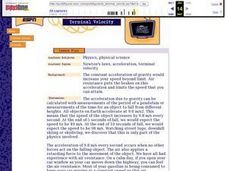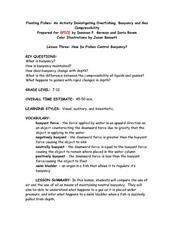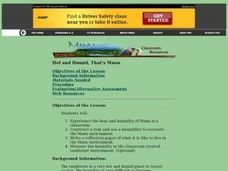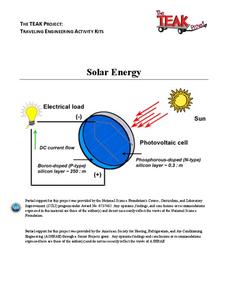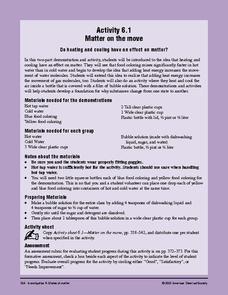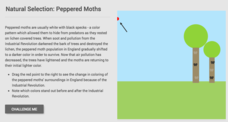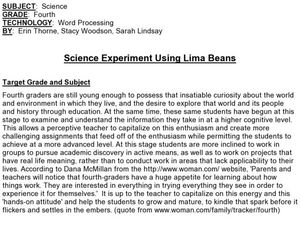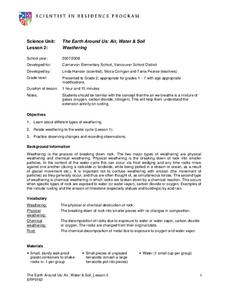Curated OER
Terminal Velocity
Students calculate acceleration due to gravity with the measurements of the period of a pendulum or measurements of the time for an object to fall from different heights. They observe and measure the effect of air resistance on the...
Curated OER
Floating Fishes: How do Fishes Control Buoyancy?
Playing with balloons, water, oil, and bottles help put this lesson over the top! Participants use air-filled balloons in water tanks to experience gas compression. They also use oil-filled bottles to experiment with buoyancy. Included...
Curated OER
Bubble and Boyle
Even middle schoolers still enjoy experimenting with bubbles! They execute a series of experiments enabling them to distinguish between convex and concave surfaces, explore the properties of buoyancy, surface tension, and density,...
Curated OER
Hot and Humid, That's Manu
Elementary and middle schoolers participate in a demonstration of the heat and humidity of the Manu rainforest environment. They watch and discuss a video, calculate the humidity and temperature in the humidified tent, and write a...
Curated OER
Water Cycle Lesson Plan
After conducting experiments with a sponge, ice water, and a soda bottle your young scientists become familiar with the water cycle through experiment, song, hand motions and drawing. Students sing about the water cycle and discuss what...
Berkeley Engineering and Mentors
Egg Drop
How do different shapes affect the outcome associated with hard impact? All you need is an egg and some recycled materials to find out. Kids experiment to understand how airbags work to lessen the impact of two different types of...
Curated OER
Lesson Plan #3 ~ Ocean Currents
Sixth graders experiment to understand the ocean's currents. In this ocean current activity, 6th graders complete an experiment with two bottles of water and an index card to discover information about the ocean current. Students...
NASA
Decomposers Get Energy From Dead Things
When life gives you mold, make penicillin. Scholars design an inquiry experiment to determine what causes rotting and mold growth. It also covers decomposers and the important role they play for other living things.
Curated OER
2008 U.S. National Chemistry Olympiad Part III
In this chemistry olympiad lab worksheet, chemists are required to design two experiments. In one, they design an experiment to identify seven solutions given to them in pipettes. In the other, they design an experiment to determine the...
NASA
Producers Make Their Own Food
During an inquiry-based lesson, scholars decide which variable to test and then design an experiment to determine the needs of producers. After two weeks, they complete a full analysis and research paper.
Curated OER
Impulse, Momentum, and the Conservation of Momentum
What happens when two worlds collide? In the first of several activities, future physicists experiment with colliding ball bearings or Newton's cradle. Another activity requires the use of an air track with cars to examine collision....
Rochester Institute of Technology
Solar Energy
Warm up to the idea of solar energy. A lesson plan includes three activities that challenge scholars to apply knowledge in new ways. First, they learn to run an alarm clock without a battery by using solar energy. Next, they complete an...
Alabama Learning Exchange
Make a Difference!
We are very dependent upon other life forms around us to survive. Here, scholars explore relationships in the ecosystem with the help of Auntie Litter and the pollution patrol. They imagine a world without grass, making connections to...
American Chemical Society
Matter on the Move
Start this mini unit on matter out by demonstrating how food coloring behaves when placed in cold and in hot water. Then have the class experiment with warm water and soap film. Pupils will learn that an increase in thermal energy also...
Weather Wiz Kids
Cloud in a Bottle
This resource provides a short experiment for students to explore how clouds are formed.
National Christmas Tree Association
Merry Christmas, Geraldine
If you're reading the story "Merry Christmas, Geraldine" by Holly Keller, this is a fantastic cross-curricular resource to use. Complete with activities for language arts, science, social studies, art, and math, you'll get the most out...
Chymist
Landfills and Recycling
Examine the nature of landfills through experimentation. Scholars build miniature landfills and monitor changes over a six-week period. Observations allow individuals to draw conclusions about the different types of trash and their...
CK-12 Foundation
Natural Selection: Peppered Moths
Can human activity influence the colors of moths? The simulation explains how pollution changed the color of tree bark, which led to the survival of a different variation of moths. It also discusses the shift back as air quality improves.
Curated OER
Science Experiment Using Lima Beans
Fourth graders tie together elements about the world and their environment. Students incorporate styles of higher order thinking skills. Students measure skills of observations, conclusions, inferences and predictions.
Curated OER
How Do You Know There is Air in a Bag?
Fourth graders explore air as a material substance. Through experimentation and discussion, they explore how air can be classified as a material substance. Students write three examples proving that air is a material substance in their...
Curated OER
Make a Bouncy Custard Ball
In this science experiment worksheet, students mix borax, custard powder (pudding mix?), glue and water to make a bouncy ball. Students carry out bouncing and stretching investigations.
Nuffield Foundation
Measuring Rate of Water Uptake by a Plant Shoot Using a Potometer
How quickly does a plant transpire? Learners explore this question through measuring water uptake with a potometer. They time the movement of a bubble a set distance to understand the motion and rate of speed.
Curated OER
Reflection and Refraction
What is a prism? A place for light waves that commit minor refractions! The thorough resource includes three hands-on investigations covering light reflection and refraction; mirrors, lenses, and images; and optical systems. Subject...
Curated OER
Weathering
Second graders explore weathering and how the water cycle plays a part in weathering. In this weathering lesson, 2nd graders put gravel and sugar cubes in a jar and shake, simulating weathering. Students use the scientific method to do...


